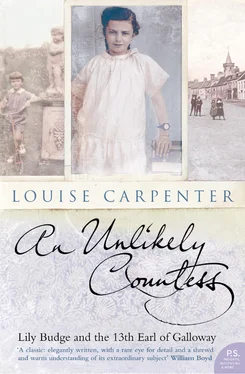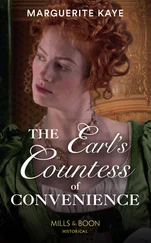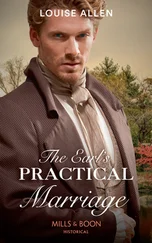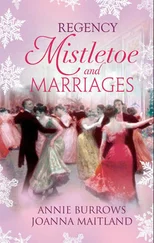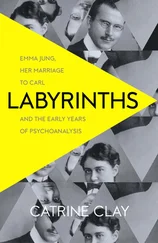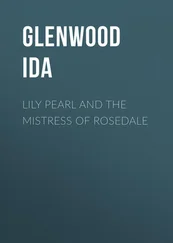As Lily grew up, there was none of the gossip that had followed the birth of her sister, Agnes, two years before. Plump and blonde, Agnes, affectionately called Etta, was as physically different from her father as a child could possibly be. Lily, by contrast, had been declared Andrew Miller’s from the start. She possessed his wiry frame, the same long nose, strong jaw, and cloudy, bulbous blue eyes. When her mother scraped her black hair back from her wide pale face, knotting it in two coiled snakes by her ears, the resemblance was indeed remarkable.
John Andrew Miller liked to say he had blue blood in his veins, or bluish at least. His mother had been a Scottish servant girl called Mary Jane Bryden and she had conceived him while in service. His father, she had told him vaguely, was a man connected with the household. Once her condition had begun to show, she had been dismissed. She kept her son for eight years, but when she met a new lover she promptly gave him away to the Miller family in Glasgow, from whom he took his name.
Andrew Miller was a clever boy, the brightest in the school, he claimed, but at fourteen his education came to an abrupt halt when he discovered he now had to earn his keep. He arrived in Duns some time before 1910, probably around 1905, an unusual step, for one brother was a coal miner, the other a baker, and it would have been more natural, expected even, for him, too, to have stayed in Glasgow at the centre of the pre-war Scottish economic boom. But he wanted to work in open fields, and there were not many of those in Glasgow. The Borders made sense. After agricultural labour, domestic service provided the chief source of employment. There were many grand houses and estates dotted along the River Tweed, such as Manderston, famous for its intricate silver staircase, which required many servants.
Andrew Miller quickly found a job. He was taken on as a trainee groom in a large house called Anton Hills, eight miles from Duns town, where he slept on a narrow bed in a cramped grooms’ dormitory with panelled walls and a basin in the corner. From Anton Hills, he moved on to the much bigger and grander estate of Duns Castle, owned by the Hay family, local gentry, patrons of the poor, and dispensers of pennies at Christmas time. By now, Andrew Miller possessed all the characteristics of an adolescent boy – a scrawny overgrown body, gangling limbs, and a ghostly teenage pallor highlighted by his black hair and light, serious eyes. To relax he boxed in matches against other grooms using his bare fists. He liked to drink, too, although rarely to excess. Add in the smell of the stables and a girl might have had reason to look beyond him for a husband. Sis, however, knew a good thing when she saw it.
Her real name was Annie Colvin, after her mother, but her brothers called her Sis and, because one was notorious in the town (for drinking and poaching), she became Sis to everybody else. Sis came from a family of drunks. Her father had dementia, her mother drank, and then there were those brothers of hers, who possessed barely a social skill between them. To begin with the Colvins were a family of nine – death would claim the sickliest, one by one – crammed into a shack-like house with an earthen floor and two windows. When Sis left school at nine to look after her mother’s new baby, it was by unspoken agreement that she took over the housework too. Thereafter she cooked, cleaned, and looked after all her siblings. This upbringing was to have consequences for her own daughters. She had no notion of what it meant to be a child; her thoughts ran solely on making ends meet. She bore a hatred of alcohol; she deeply distrusted education (which she considered something to be tolerated and on no account to be pursued further than necessary); and she had a contradictory attitude towards children. She viewed them both as good – a woman’s role in life – and bad – an economic drain, especially when born into poverty, which in itself she considered an act of supreme irresponsibility.
When Andrew Miller met Sis she was a well-established presence at the mill. Day after day, in the early morning darkness, she joined the gang of women who made the long walk along the road that led out from Duns. Sis was pleasant looking in the way that the plain often are: petite with wavy, mousy hair, a reasonable figure and small, round unsmiling brown eyes. (Her younger sister was the real beauty, but she was to die giving birth to her illegitimate child.) Heaven knows exactly how her path crossed with Andrew, since Sis rarely indulged in dancing and never in drinking, but in 1910, when she was twenty, she gave birth to the girl who became known as Etta. Papa, as Sis began to call Andrew, always explained his initial hesitance in marrying her as a result of his ‘bachelor’ job at the castle. This cannot have angered Sis too much, despite having to spend another three years under her mother’s roof, for on 25 September 1913, she married him at 1 Duke Street, Glasgow, by common declaration, with Papa’s brothers, William the coal miner and James the baker, as witnesses.
Papa recognised in his new wife the courage and spirit he lacked himself. She had a fighting, steely nature and offered him the prospect of a secure family environment (he had been old enough to remember his mother abandoning him). Sis saw that Papa was free of all the vices of her own family. In his knee-high boots, riding hat, and voluminous breeches, as he proudly drove his horses through town, with their polished saddles on glossy black flanks, he was considered a splendid sight and quite a gentleman. But while each filled the other’s needs, they were ill-suited at heart. Aside from a skill for mimicry, Papa was quiet and self-contained, dour even, certainly not prone to the great surges of emotions that erupted from his wife. He had always regretted his thwarted education and as an adult, became a determined autodidact, spending hours poring over Scottish literature. At one stage he even attempted to compile a history of the Scots language, which Sis would throw on the bonfire after his death. Sis hated books and frippery, and found it hard to control her feelings, particularly if she suspected he had been drinking at the bar of the Swan Hotel.
They had been married one year when the First World War broke out. Papa did not have the resolve to become a conscientious objector, but the idea of war horrified him nevertheless. He could not hide in the stables for long. In January 1915, for example, Country Life ran an editorial posing five questions:
1. Have you a Butler, Groom, Chauffeur, Gardener, or Gamekeeper serving you who, at this moment should be serving your King and Country?
2. Have you a man serving at your table who should be serving a gun?
3. Have you a man digging your garden who should be digging trenches?
4. Have you a man driving your car who should be driving a transport wagon?
5. Have you a man preserving your game who should be helping to preserve your Country?
As Pamela Horn points out in Life Below Stairs in the 20th Century , in all the great houses in Scotland and England, building projects and improvements stopped, freeing up the men to fight. Gardens once lovingly tended were given over to potato growing, and much of the work on the estates, both indoors and outdoors, was carried out by women – those who did not go into munitions factories – be they former housekeepers and maids, or members of the Women’s Land Army. In the various gentlemen’s clubs, such as the Athenaeum in London, waitresses replaced the all-male staff. Mrs Cornwallis-West, the former Lady Randolph Churchill, readily embraced the change, and one hostess replaced her footmen with a set of ‘foot girls’, handsome, strapping young women in blue livery jackets, stripped waistcoats, stiff shirts, short blue skirts, black silk stockings, and patent leather shoes with three-inch heels. Most employers were less brazen. In the big hotels in Edinburgh, such as the Caledonian, staff quickly became depleted. In January 1916, conscription was introduced and Papa had no choice. He joined the Scots Greys, was wounded in the battle of the Somme in 1916, and returned home immediately. From that day on, he refused to talk of his war experiences, so his family never really knew what had happened to him – only that he came back pensioned off.
Читать дальше
